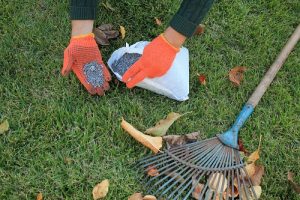 Fertilizer is essential for maintaining a healthy, green lawn. Most homeowners skip fertilizing their lawns because they don’t know what products to use or how to apply them. The problem is made worse by the fact that lawn fertilizer can cause more harm than good if it isn’t applied properly. Here are a few things you need to know about lawn care.
Fertilizer is essential for maintaining a healthy, green lawn. Most homeowners skip fertilizing their lawns because they don’t know what products to use or how to apply them. The problem is made worse by the fact that lawn fertilizer can cause more harm than good if it isn’t applied properly. Here are a few things you need to know about lawn care.
Lawn Care: Easy-to-follow guidelines for lawn fertilization
Make sure to check the temperature of your soil
The best time to fertilize your lawn is in spring when the soil temperature (not the air temperature) reaches 55o Fahrenheit. The lilacs and grass will bloom when the soil reaches 55o.
You can also buy a soil thermometer to check the temperature at any moment. This means that the application of lawn fertilizer should be done by mid-April in most areas of the country. If you haven’t yet started, mark the date.
Get the numbers
Three numbers are printed on fertilizer labels when you shop for it. These numbers are the primary nutrients required to feed your lawn.
Use a slow-release fertilizer
Slow-release fertilizers are slower to break down nutrients so that you can wait for them to be used again. Slow-release fertilizers can be applied every six to eight weeks, depending on how you water your lawn. This saves both time and money.
Use Granules
Professional landscapers will often spray the entire lawn with fertilizer in a tanker truck. Pros do this every day so they are familiar with how to account for wind and ensure even coverage. They also have the right equipment to do the job correctly. For homeowners, granules are super easy to apply with a spreader.
The second feeding should be done approximately four weeks after the initial application. It should take place around mid-May. You should fertilize your lawn every six to eight weeks from that point onwards, right through October. Instead of using a traditional fertilizer, you can use organic materials such as manure for the third feeding.
Remember to also feed your plants in fall. This is actually the most important fertilizer application for the entire year. Use a slightly higher level of phosphorous or potassium in fall fertilizer to promote root growth.
Remember to water
Contrary to popular belief, lawns that are tended to be more watered need more fertilizer. You need more fertilizer if your lawn is growing faster. The grass needs more nutrients as it grows. You should fertilize your lawn every six weeks if you have an automatic sprinkler system. You can wait two additional weeks without a sprinkler system before you fertilize your lawn.
You should also carefully read the label on fertilizer to determine if you should water your lawn before or after fertilizer application. Granulated fertilizers require moisture to be broken down. Some fertilizers may require that you soak the lawn before application.
Get rid of the Hopper, and fill up your Spreader
Once you are ready to put fertilizer in the spreader, place it on your driveway or patio. You can also put a tarp underneath it. This will prevent any granules that have escaped from the spreader from collecting in one place on the lawn. They can then burn the grass. Before filling the spreader, make sure that your hopper is closed. This is lesson number one, which everyone should learn at least once.
Don’t apply too much
Conners advises against following the label on fertilizer labels. Half of the recommended rate on the bag should be used. Applying fertilizer with the spreader open is one of the most common mistakes homeowners make. He suggests spreading fertilizer at half to slightly less than the recommended rate by the manufacturer.
Before fertilizing, check the weather forecast. Apply the fertilizer just before it rains. This will cause a lot of fertilizer to be washed away.
Stray Granules:
The spreader can occasionally dump fertilizer on your patio, sidewalk, or driveway. It is better to sweep it up than let the rain wash it away.
Once you have finished fertilizing your lawn with fertilizer, take any remaining fertilizer from the spreader and put it back in its original bag. Seal the bag tightly and keep it dry. Keep it out of reach of pets and children.
Call Conner’s Lawn Care Service now if you need help taking care of your lawn.
Like our Facebook page for more great info about lawn care.
Conner’s Lawn Care Service
Myrtle Beach, SC
843-504-4901
http://connerslawncare.com/